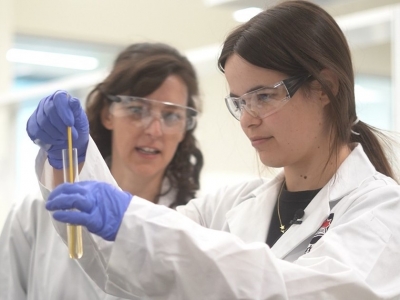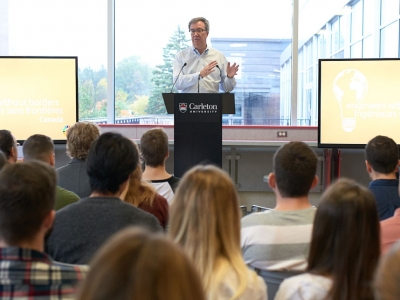By Matt Gergyek
Photos by Justin Tang
In 2009, Rebecca Andre, now a second-year Applied Linguistics and Discourse Studies student at Carleton University, began experiencing the symptoms of chronic thromboembolic pulmonary hypertension, a rare progressive fatal illness.
“This was right in the middle of my college career,” she says. “I finished, but the last year was miserable. I was 21 years old and right when everyone else is about to start their lives, all of a sudden I was in and out of the hospital and that was my life, that was my start.”
After four years, Andre’s illness was finally diagnosed and she began to undergo proper treatment and rehabilitation in 2014. It was around this time she decided: “I need to own my life again.”
“I progressively started to stretch my wings,” she says. “I realized I still had the passion for learning.”
She started volunteering and enrolled in a college preparation program, eyeing a degree at Carleton. In 2017, she arrived on campus and began to take on her future like never before.
“When I got my first A, I bawled like a baby,” she remembers. “I was in the library and I had a complete breakdown . . . it was so validating that I had done the right thing coming back to school. I knew I was on the right path.”
While finding her way back into the post-secondary system was a big step for Andre, getting back into the workforce was a whole other story. But thanks to the Carleton University Accessible Experiential Learning (CUAEL) Project, Andre is making her way into the working world and she couldn’t be more excited.
The CUAEL project was launched in May 2018 as an initiative that helps students with disabilities excel in their careers and build on the monumental contributions people with disabilities make to society.
“I feel on fire right now; I feel like I’m ready to take over the world,” Andre says.
Andre works in Carleton’s Student Experience Office (SEO), which provides extracurricular experiences for students, such as summer and fall orientation programs and the alternative spring break with a roster of volunteer opportunities. The SEO also helps new students transition to life at Carleton.
“The CUAEL program is a really important part of the quality of my life,” she adds. “It brought back my confidence, it increased my self-esteem, it gives me another way to get out in the world and, most important of all, it makes me feel like I’m a contributing member of society again.”
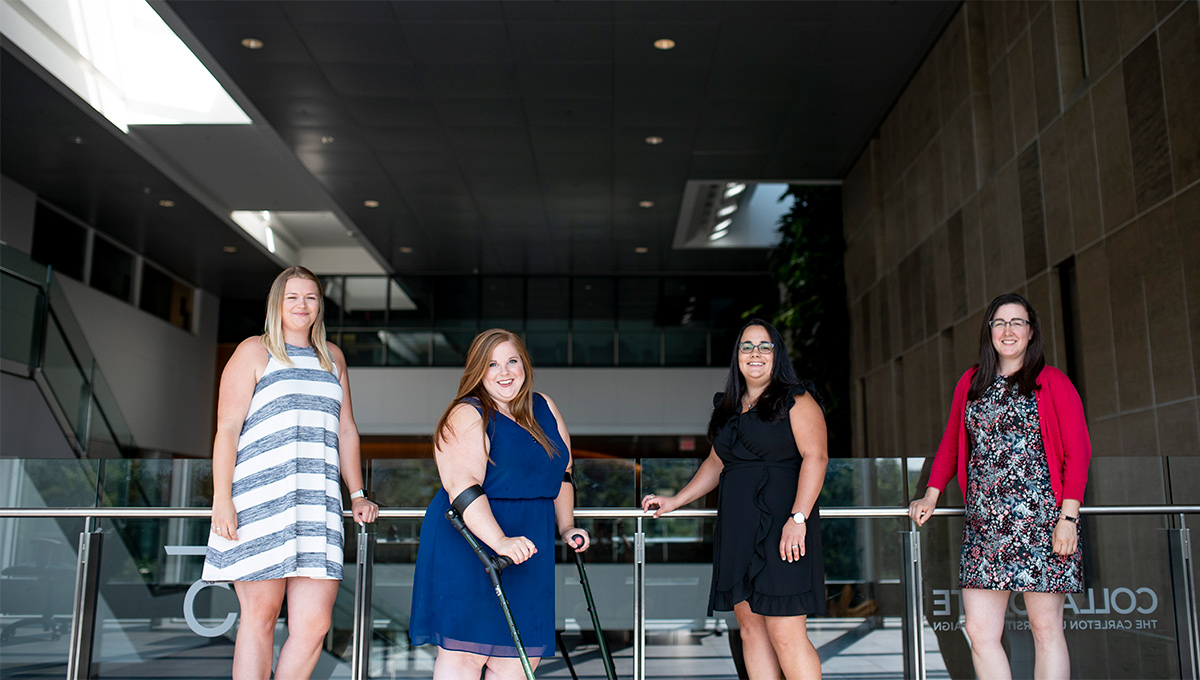
Addressing a Gap in the Workforce
“At Carleton, students with disabilities are graduating on par with the general student population, but there still seems to be a gap when it comes to entering the workforce,” says Amanda Bettencourt, senior special project officer at the CUAEL project.
Accessibility issues and stigma, along with exclusive workplaces, create serious barriers to the work experience for students with disabilities.
“One of the most unfortunate things would be if you get to an interview for a job, you get to the job site, you’re five minutes early and you can’t get up to where it is you’re going. Maybe there’s no elevator, maybe you need a code . . . maybe you can’t even see that it exists.”
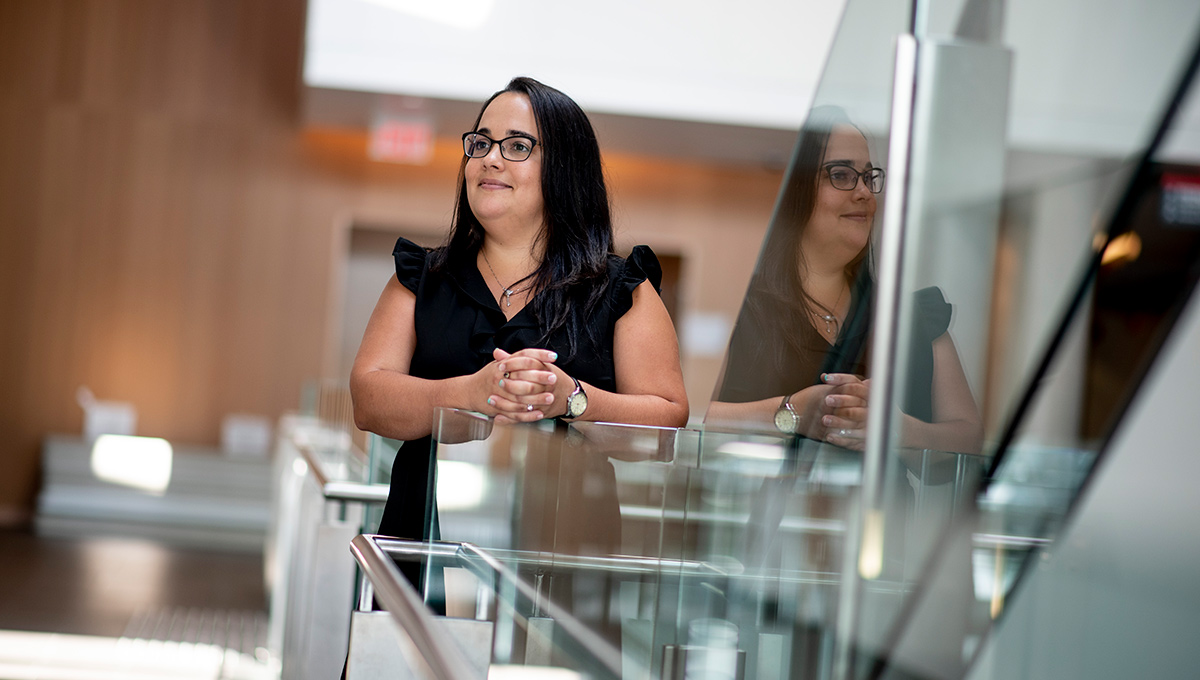
Amanda Bettencourt
CUAEL works with employers to explore where barriers may exist and how to create accessible workplaces. Employers interested in learning more about the program, or those looking to become an Employer Champion with the CUAEL project, can create partnerships now for part-time positions in the winter 2019 term, as well as part-time and/or full-time positions for the summer 2019 term. Interested parties may contact Amanda Hodgson, CUAEL’s business development officer, to discuss how to become a CUAEL partner.
“The job opportunities for persons with disabilities are very, very limited,” says Kawsar Mohamed, a Human Rights and Social Justice student at Carleton in the CUAEL program.
“There’s rarely bad intentions . . . but it’s almost like a fear of not understanding a person and their disability.”
This is where the CUAEL project comes in — the program aims to bridge the gap between education and the workforce, transforming skillsets developed at Carleton into employment opportunities. At its heart, the CUAEL project will strive to connect 300 students with disabilities to subsidized experiential learning opportunities, hands-on learning placements that prepare students for the transition to work in their prospective fields.
“What we’re trying to do is educate students on the disclosure process and the resources students and their employers need to ensure they’re accommodated,” Bettencourt explains. “Let’s create inclusive environments and accessible workplaces so that maybe in the future someone would not have to initially disclose that they have a disability or have something that needs to be accommodated, because it’s not just built into the [physical] structure but into the way a business is run as well.”
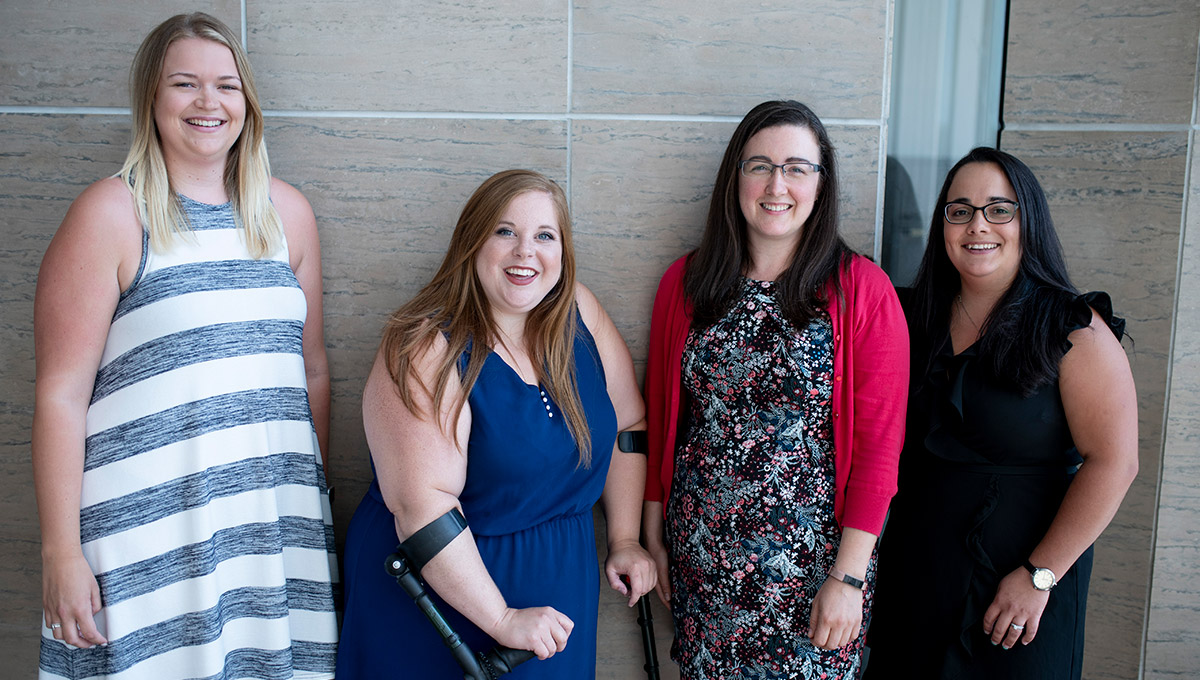
Accessible Workplaces Benefit Everyone
Through the CUAEL program, Mohamed is working with Community First: Impacts of Community Engagement (CFICE) as an administrative research assistant on campus. CFICE is a research project studying how community and campus players can work together to positively impact their communities.
“This program is excellent because it gives you the experience you need to venture out there . . . It’s been a very positive experience,” she says.
Moreover, Bettencourt says that making workplaces accessible and mindful of disabilities benefits everyone.
“Having a depressed curb, for example, doesn’t just help someone with an [assistive device], but someone with a stroller, someone pushing a shopping cart, the elderly . . . It goes beyond persons with disabilities,” she says.
The project is taking off thanks to an $800,000 grant from the provincial government’s Career Ready Fund. The campaign to bring the funding to Carleton was a joint effort between two campus departments: the Paul Menton Centre (PMC), and Carleton’s Career Services office.
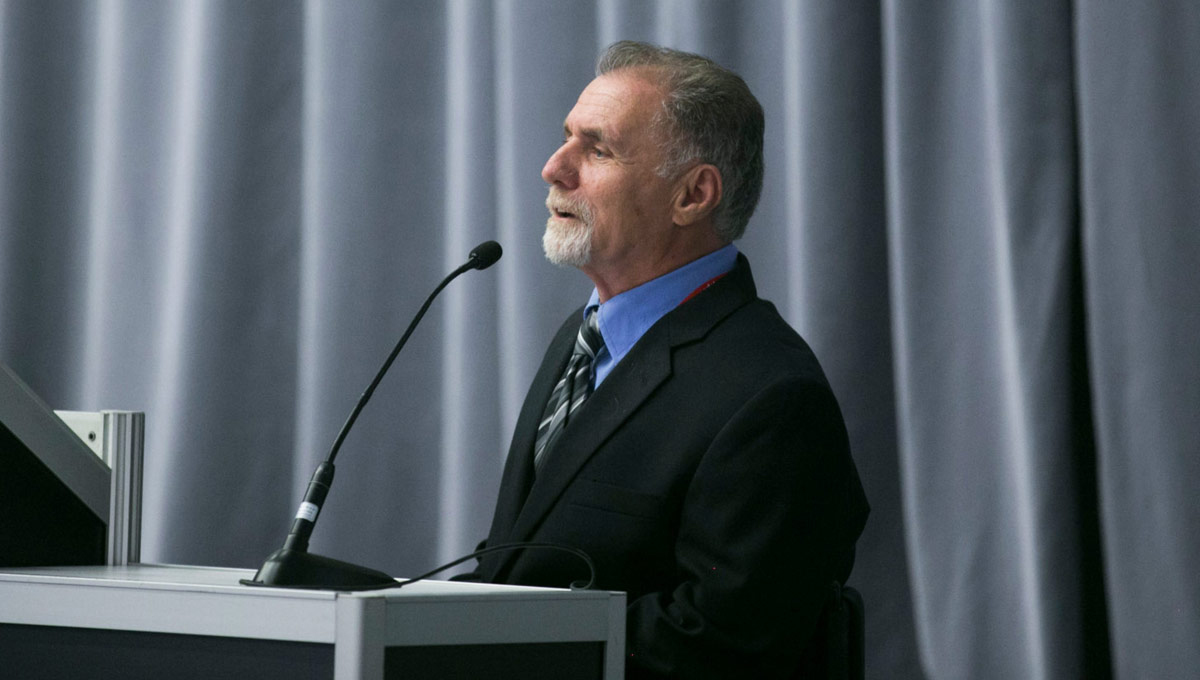
Dean Mellway
Dean Mellway is a special adviser to the Research, Education, Accessibility and Design (READ) initiative, a program designed to highlight, celebrate and cultivate Carleton’s expertise, leadership and collaboration with the community to create greater accessibility and a more inclusive world.
Mellway says that after doing some background research to pinpoint where the fund could be best applied, the team found two major issues on post-secondary campuses across Canada that pushed them to pursue the grant.
“One, there wasn’t staff dedicated to supporting people with disabilities and two, students weren’t prepared in the sense that they weren’t getting job experience while they studied,” he says.
“The reason we pursued that grant was to make sure students had the opportunity to get experience while they studied.”
Part-time experiential learning opportunities running throughout the school year will be completely subsidized by the grant, less deductibles, while full-time opportunities, which are running in the summer 2019 term, will be partially subsidized. Students so far have been especially interested in working with companies such as Shopify, IBM or the provincial and federal governments.
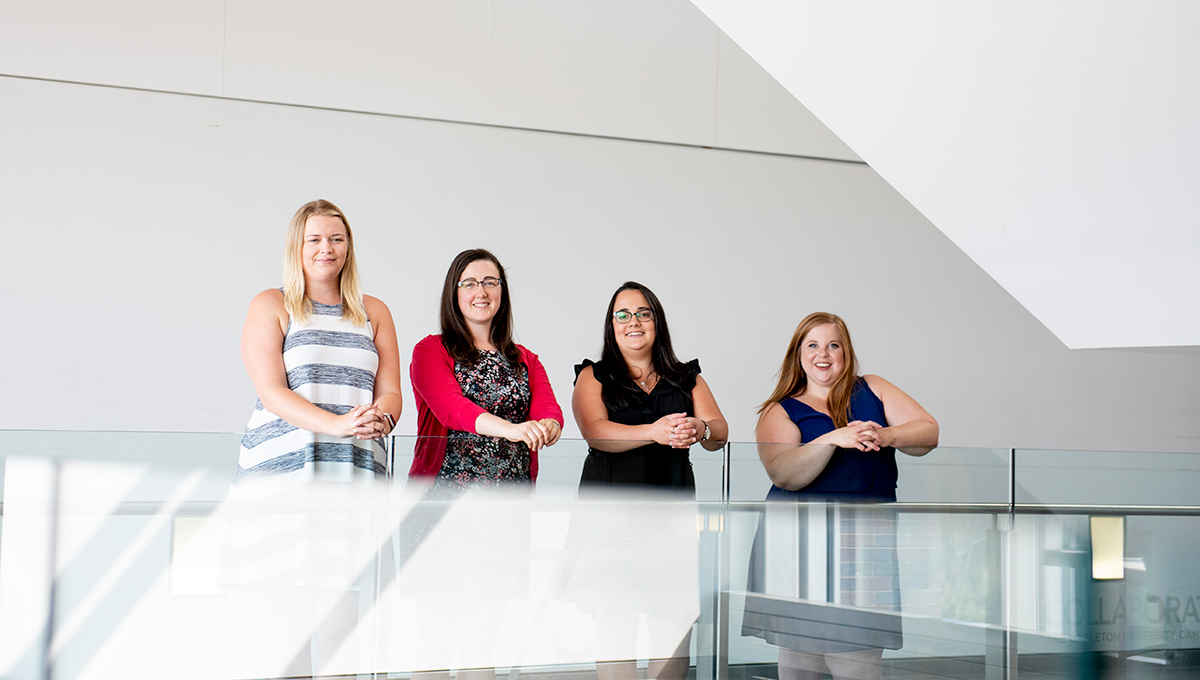
Supporting Students at Every Stage
The Career Services office will work closely with CUAEL project staff to ensure students are supported at every stage of their job search and feel prepared for the transition to work, including during and after their placement. Through resume and cover letter review services, job interview preparation, including mock interviews, and individualized career advising sessions, Career Services helps students enhance their job readiness and gives them the knowledge and employability resources they need to market themselves to employers and be successful at work.
More Interesting Reads
Jenna Lambert, student adviser with the CUAEL project, emphasizes the importance of learning outside the classroom.
“Being able to put the skills you learn in the classroom to use builds passion,” she says, and “this snowballs into something beautiful in the end.
“It’s so important for students to have these opportunities to figure out what employment looks like for them, what a career looks like for them, to have those experiences, to build their resume, so they’re able to go out and find valuable work after university.”
Jenny Midwinter, a Carleton Engineering alumnus who now runs Gray Jay, an applied artificial intelligence (AI) company working to develop an automated wheelchair design, has hired two students through the CUAEL program.
“The students have been excellent and dedicated,” she says.
One of these students is helping Gray Jay run tests on the prototype design and is developing codes for the robotic components of the wheelchair. The other is building the organization’s web page and web applications.
“At the end of the day, engineering . . . is based on meritocracy, where it’s what you produce and build that’s judged, not a person or their disability,” Midwinter says. “Diversity is always a good thing. That’s fundamentally what really matters in a workplace.”
There are about 3,000 students with disabilities registered at Carleton (one in 10 students overall) and more than 90 per cent of these students have invisible disabilities.
Bettencourt says students with disabilities are already well equipped to excel in work positions in their area of study since they have already been forced to navigate environments that are not typically built with their disabilities in mind, building resilience in the process.
“That’s the kind of person you’ll be getting in your workplace – someone who is a self-advocate. They understand exactly how they learn and what they can do,” Bettencourt says. “Our students . . . acknowledge that successful people are those who ask for help, they ask the important questions.”
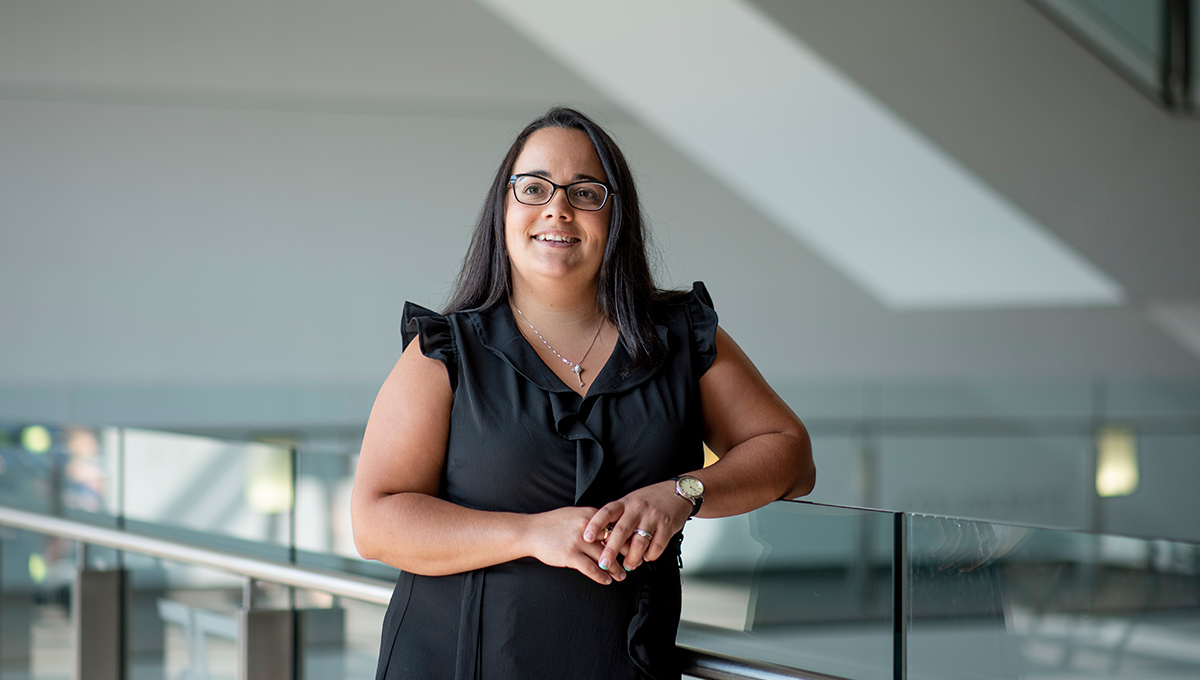
A Culture of Accessibility
Bettencourt has some important words for employers and fellow employees on how to work with people with disabilities.
“Never, ever make assumptions. Our students are just like any other person: they’re going to be able to say what they need to succeed.”
Bettencourt and the team are extremely excited to watch Carleton students do amazing things.
“We’ve always maintained here that students are their own best advocates: we support them along the way whenever they need it and it’s no different going into the workplace.”
CUAEL is helping Carleton continue to build on its culture of accessibility, disability awareness and inclusion for all.
The PMC and READ initiative have both become staples on campus, along with the From Intention to Action (FIT: Action) program, which helps struggling students who do not meet the criteria for PMC or READ programs. Additionally, Carleton offers attendant and personal care services around the clock, 365 days a year, to students with disabilities living in residence.
Meanwhile, the newly launched David C. Onley Initiative for Employment and Enterprise Development will play an important role as well. The Onley initiative is a partnership between four of Ottawa’s post-secondary institutions (Carleton, University of Ottawa, Algonquin College and La Cité) to develop knowledge, resources and tools to support students with disabilities in advancing their careers.
Monday, November 5, 2018 in Accessibility, Careers
Share: Twitter, Facebook

